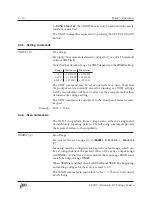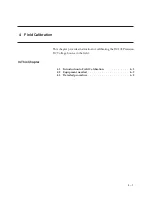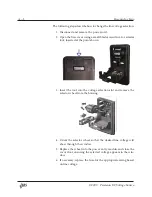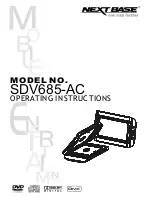
3.5 Status model
3 – 19
ESB : Event Status Bit. Indicates whether one or more of the enabled
events in the Standard Event Status Register is true.
MSS : Master Summary Status. Indicates whether one or more of the
enabled status messages in the Status Byte register is true.
This register is read with the
*STB?
query.
3.5.2
Service request enable (SRE)
Each bit in the SRE corresponds one-to-one with a bit in the SB regis-
ter, and acts as a bitwise AND of the SB flags to generate MSS. Bit 6 of
the SRE is undefined—setting it has no e
ff
ect, and reading it always
returns 0. This register is set and queried with the
*SRE(?)
command.
At power-on, this register is cleared.
3.5.3
Standard event status (ESR)
The Standard Event Status Register consists of 8 event flags. These
event flags are all “sticky bits” that are set by the corresponding
events, and cleared only by reading or with the
*CLS
command.
Reading a single bit (with the
*ESR?
i
query) clears only Bit
i
.
Weight
Bit
Flag
1
0
OPC
2
1
undef (0)
4
2
QYE
8
3
DDE
16
4
EXE
32
5
CME
64
6
undef (0)
128
7
undef (0)
OPC : Operation Complete. Set by the
*OPC
command.
QYE : Query Error. Indicates data in the output queue has been lost.
DDE : Device-Dependent Error.
Indicates an internal command
queue overflow.
EXE : Execution Error. Indicates the error in a command that was
successfully parsed. Out-of-range parameters are an example.
CME : Command Error. Indicates a command parser-detected error.
3.5.3.1 Standard event status enable (ESE)
The ESE acts as a bitwise AND with the ESR register to produce the
single-bit ESB message in the Status Byte Register (SB). The register
can be set and queried with the
*ESE(?)
command.
DC205 Precision DC Voltage Source







































